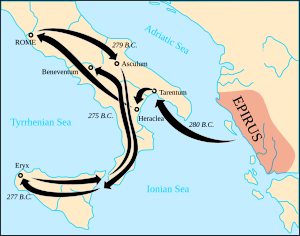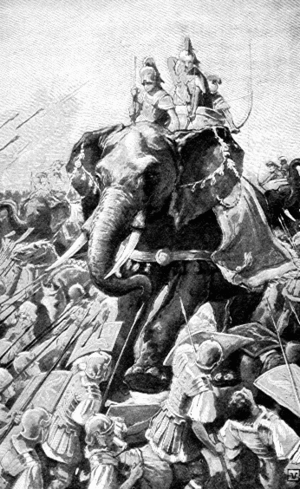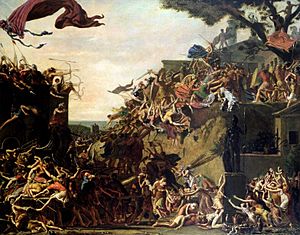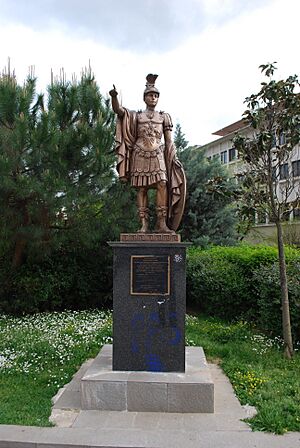Pyrrhus facts for kids
Quick facts for kids Pyrrhus |
|
|---|---|
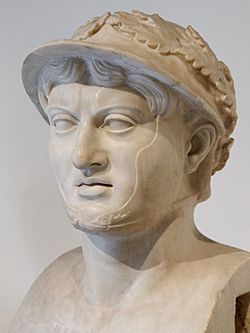
A marble bust of Pyrrhus from the Villa of the Papyri at the Roman site of Herculaneum, now in the National Archaeological Museum of Naples, Italy
|
|
| King of Epirus | |
| Reign | 297–272 BC (second reign) |
| Predecessor | Neoptolemus II |
| Successor | Alexander II |
| Reign | 307–302 BC (first reign) |
| Predecessor | Alcetas II |
| Successor | Neoptolemus II |
| King of Macedonia | |
| Reign | 274–272 BC |
| Predecessor | Antigonus II |
| Successor | Antigonus II |
| Reign | 288–285 BC |
| Predecessor | Demetrius I |
| Successor | Antigonus II |
| Tyrant of Syracuse | |
| Reign | 278–276 BC |
| Predecessor | Thinion & Sosistratus |
| Successor | Hiero II |
| Born | c. 319 BC Epirus, Greece |
| Died | 272 BC (aged about 46) Argos, Peloponnese, Greece |
| Spouse |
|
| Issue |
|
| Dynasty | Aeacidae |
| Father | Aeacides |
| Mother | Phthia |
| Religion | Hellenism |
| Military career | |
| Battles/wars |
|
Pyrrhus ( PIRR-əss; Greek: Πύρρος Pýrrhos; 319/318–272 BC) was a powerful Greek king and leader from the Hellenistic period. He was king of the Molossians and later became king of Epirus. Pyrrhus was a strong enemy of early Rome. Many people thought he was one of the greatest generals of ancient times. He won some battles, but lost so many soldiers that the victories felt like defeats. This is where the phrase "Pyrrhic victory" comes from.
Pyrrhus became king of Epirus in 306 BC when he was only 13 years old. But he lost his throne four years later. He fought in the Wars of the Diadochi (wars between Alexander the Great's generals). With help from Ptolemy I Soter, he got his throne back in 297 BC. During the Pyrrhic War, Pyrrhus fought against Rome. He won costly battles at Heraclea and Asculum. He then took over Sicily from Carthage, but was soon forced to leave. He lost all his gains in Italy after the Battle of Beneventum in 275 BC.
Pyrrhus took the Macedonian throne from Antigonus II Gonatas in 274 BC. He then invaded the Peloponnese in 272 BC. His attack on Sparta failed. Pyrrhus was killed during a street battle in Argos.
Contents
Early Life of Pyrrhus
Pyrrhus was born around 319 BC. His father was Prince Aeacides of Epirus, and his mother was Phthia. Pyrrhus was a second cousin to Alexander the Great. He had two sisters, Deidamia and Troias. When Pyrrhus was two years old, his father was dethroned. Pyrrhus and his family had to flee and found safety with King Glaukias of the Taulantians, an Illyrian tribe. Pyrrhus was raised by Beroea, King Glaukias's wife.
In 313 BC, Pyrrhus's father, Aeacides, returned to Epirus. He raised a large army, but was defeated in two battles. Aeacides was wounded and died soon after.
Pyrrhus's First Time as King
In 307 BC, King Glaukias helped Pyrrhus become king of Epirus. Pyrrhus was only eleven years old. So, his guardians ruled for him. When he was seventeen, he left Epirus to attend a wedding. While he was away, the Molossians rebelled. They forced Pyrrhus's supporters out and put Neoptolemus back on the throne.
Pyrrhus in Exile
After losing his throne, Pyrrhus went to the Peloponnese. He served his brother-in-law, Demetrius Poliorcetes. Demetrius was fighting against Cassander in southern Greece.
The Battle of Ipsus
In 302 BC, Demetrius took his army to Asia Minor. He went to help his father, Antigonus Monophthalmus. Pyrrhus fought bravely in the Battle of Ipsus. This was a very large and important battle. Even with their efforts, Antigonus lost the battle and his life. Pyrrhus continued to serve Demetrius.
Help from Ptolemy
In 298 BC, Pyrrhus was sent to Alexandria as a hostage. This was part of a peace deal between Demetrius and Ptolemy I Soter. While there, Pyrrhus married Antigone, Ptolemy I's stepdaughter. In 297 BC, Ptolemy decided to help Pyrrhus get his kingdom back. He gave Pyrrhus soldiers and money.
Pyrrhus's Second Time as King
Pyrrhus returned to Epirus with an army. He agreed to rule Epirus together with Neoptolemus. But soon, both kings started to plan against each other. Pyrrhus learned of a plot to kill him. He acted first and had Neoptolemus murdered. The people of Epirus seemed to support Pyrrhus.
In 295 BC, Pyrrhus moved his capital to Ambracia. In 292 BC, he went to war against Demetrius. He invaded Thessaly while Demetrius was busy. Demetrius quickly returned with a large army. Pyrrhus, with fewer soldiers, went back to Epirus.
Pyrrhus faced another problem. His second wife, Lannasa, left him. She took her dowry and went to Corcyra. She offered herself and her wealth to Demetrius, who accepted. Demetrius then planned to invade Epirus. Pyrrhus raised his army and marched to help his allies. The two armies met in battle. Pyrrhus fought Demetrius's general, Pantauchus, in a one-on-one fight. Pyrrhus won, wounding Pantauchus. His army was very proud and called him 'Eagle'. Demetrius then went back to Macedon.
In 289 BC, Pyrrhus invaded Macedonia because Demetrius was sick. He raided the area with little resistance. But when Demetrius recovered, Pyrrhus had to retreat.
Demetrius planned to invade Asia. He made peace with Pyrrhus, giving him some land in Macedonia. But other kings, Lysimachus, Ptolemy, and Seleucus, allied against Demetrius. They asked Pyrrhus to join them. Pyrrhus decided to join the allies.
In 288 BC, the allied kings attacked Demetrius. Pyrrhus invaded southern Macedonia. Demetrius's soldiers were tired of him and left to join Pyrrhus. Demetrius had to flee. Lysimachus and Pyrrhus then shared control of Macedonia.
Demetrius gathered a new army and attacked Athens. Athens asked Pyrrhus for help. Pyrrhus marched against Demetrius, who then stopped his attack on Athens. The Athenians thanked Pyrrhus but did not let his army enter their city. Pyrrhus advised them never to let a king's army enter their city again.
Pyrrhus and Demetrius made peace again, but it did not last. In 286 BC, Demetrius invaded Asia. Lysimachus asked Pyrrhus to invade Thessaly. Pyrrhus agreed and quickly defeated Demetrius's son, Antigonus Gonatas. Pyrrhus's Greek empire was now very large. He ruled Epirus, half of Macedonia, and Thessaly.
In 285 BC, Demetrius was defeated by Seleucus. Lysimachus then wanted to get rid of Pyrrhus. He made alliances against Pyrrhus. In 284 BC, Lysimachus invaded Pyrrhus's part of Macedonia. Pyrrhus's Macedonian soldiers turned against him. Pyrrhus had to retreat to Epirus. Lysimachus then invaded and plundered Epirus.
Fighting Against Rome
The Greek city of Tarentum in southern Italy had problems with Rome. Rome sent warships into the Tarentine Gulf, which broke an old agreement. In 282 BC, the Tarentines attacked the Romans. Tarentum then asked Pyrrhus for help against Rome. Pyrrhus saw a chance to build his own empire in Italy. He made an alliance with King Ptolemy Keraunos of Macedon. Pyrrhus arrived in Italy in 280 BC.
Pyrrhus entered Italy with a large army. He had 20,000 foot soldiers, 3,000 horsemen, 2,000 archers, 500 slingers, and 20 war elephants. The elephants were a big advantage. He defeated the Romans at the Battle of Heraclea in 280 BC. Some sources say Rome lost 7,000 soldiers and Pyrrhus lost 3,000. Other sources say 15,000 Roman dead and 13,000 Epirot dead. After this victory, several Italian tribes joined Pyrrhus. He offered Rome a peace treaty, but they refused. Pyrrhus marched towards Rome, but its defenses were too strong. He then went back to Tarentum for the winter.
In 279 BC, Pyrrhus invaded Apulia. His army met the Romans at the Battle of Asculum. Pyrrhus won, but it was a very costly victory. The Romans lost 6,000 men and Pyrrhus lost 3,500, including many officers. After the battle, Pyrrhus famously said, "If we are victorious in one more battle with the Romans, we shall be utterly ruined." This is where the term "Pyrrhic victory" comes from. It means a victory that costs too much to be worth it.
King of Sicily
In 278 BC, Pyrrhus received two offers. Greek cities in Sicily asked him to drive out Carthage. At the same time, the Macedonians asked him to become their king. Pyrrhus chose Sicily, believing it offered a better chance.
He arrived in Sicily in 278 BC and ended the Carthaginian siege of Syracuse. Pyrrhus was declared king of Sicily. He even planned for his son Helenus to inherit Sicily. In 277 BC, Pyrrhus captured Eryx, a strong Carthaginian fort. Other Carthaginian cities then joined Pyrrhus.
In 276 BC, Pyrrhus talked with the Carthaginians about peace. He demanded that Carthage leave Sicily completely. The Greek cities in Sicily did not want peace because Carthage still held the strong fort of Lilybaeum. Pyrrhus then decided to attack Lilybaeum. He tried for two months but could not capture it. He realized he needed a strong navy to block the city from the sea. Pyrrhus asked the Sicilians for money and men to build ships. The Sicilians were not happy about this. Pyrrhus became very strict and set up military rule.
These actions made the Sicilians angry. They started to side with the Carthaginians. Pyrrhus decided to leave Sicily. As his ship left the island, he said, "What a wrestling ground we are leaving, my friends, for the Carthaginians and the Romans." While his army sailed to Italy, the Carthaginian navy attacked. Pyrrhus lost most of his ships.
Leaving Italy
While Pyrrhus was in Sicily, the Romans rebuilt their army. When Pyrrhus returned to Italy, he faced a much larger Roman army. After the undecided Battle of Beneventum in 275 BC, Pyrrhus decided to end his war in Italy. He returned to Epirus, losing almost all his gains in Italy. The city of Tarentum remained under his control for a while.
Final Wars and Death
His wars in the west had cost him many soldiers and much money. But Pyrrhus went to war again. He attacked his rival, King Antigonus Gonatas of Macedon. Pyrrhus won an easy victory and took most of Macedon.
Pyrrhus became unpopular in Macedon. He allowed his Gallic soldiers to rob the tombs of Macedonian kings.
In 272 BC, a Spartan named Cleonymus asked Pyrrhus to attack Sparta. Pyrrhus agreed, hoping to control the Peloponnese. But the Spartans fought back strongly, and his attack failed. During his retreat, his oldest son, Ptolemy, was killed.
Pyrrhus then got involved in a fight in Argos. He tried to enter the city with his army quietly. But the city was full of enemy soldiers. During a confused street battle in Argos, Pyrrhus was trapped. An old woman watching from a rooftop threw a tile. It hit Pyrrhus, knocking him off his horse and breaking his spine. He was then killed by a Macedonian soldier. This story is told by the ancient writer Plutarch.
Antigonus gave Pyrrhus a respectful cremation. He sent Pyrrhus's surviving son, Helenus, back to Epirus. When the Tarentinians heard of Pyrrhus's death, they surrendered to Rome.
Pyrrhus's Legacy
The famous general Hannibal thought Pyrrhus was one of the greatest commanders ever. Some say Hannibal ranked him second only to Alexander the Great. Pyrrhus was a restless leader and not always a wise king. But he was known as a brilliant military commander.
Pyrrhus was also known for being kind. As a general, his main weaknesses were not staying focused and not keeping enough money for his army. Many of his soldiers were expensive mercenaries.
The idea that a king could heal people might have started with Pyrrhus. Ancient writers said that Pyrrhus's right big toe could cure spleen diseases just by touching the patient. They also said his toe could not be burned. When his body was cremated, his toe was saved and kept in a temple.
Pyrrhus's name is used in the term "Pyrrhic victory". This comes from his comment after the Battle of Asculum. He said, "If we are victorious in one more battle with the Romans, we shall be utterly ruined." A Pyrrhic victory means a win that costs so much it feels like a loss.
Pyrrhus's campaigns in Italy were a chance for the Greek world to stop Rome from expanding. The failure to fully use this chance had huge effects. Rome's conquest of the Greek cities in Italy led to direct competition with Carthage. This started the First Punic War. Rome's victory in that war made it a very powerful state in the Mediterranean. Over the next century, the Greek kingdoms and city-states did not unite against Rome. This led to them being taken over by the Roman Empire.
Pyrrhus wrote books about the art of war. These books are now lost. But writers like Plutarch and Cicero said they were very good. Hannibal was even influenced by them.
Images for kids
-
Coin of Pyrrhus minted at Syracuse, 278 BC. Obverse: Veiled head of Phtia with oak wreath, caption ΦΘΙΑΣ (of Phtia). Reverse: Thunderbolt, ΒΑΣΙΛΕΩΣ ΠΥΡΡΟΥ (of King Pyrrhus).
 | Delilah Pierce |
 | Gordon Parks |
 | Augusta Savage |
 | Charles Ethan Porter |


